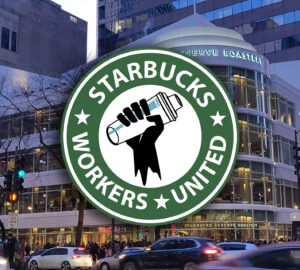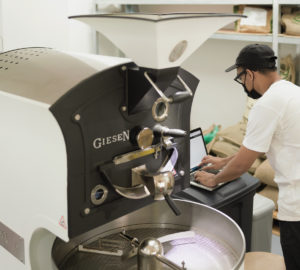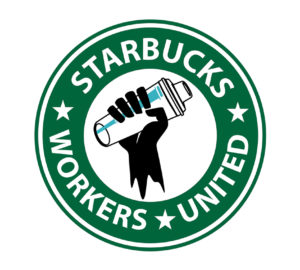
In cities large and small across the US, workers’ rights violations have long been so commonplace within the service industry that they frequently go unchallenged. Service employees often lack the time, energy, knowledge, or money to fight violations. But as more and more workers find a permanent or semi-permanent home within the service industry, more workers are learning that they do have rights in the workplace, including the ability to organize and fight for fair treatment free of retaliation. When Julia Baker and Lou Kramer, baristas and labor organizers in Pittsburgh, PA, were terminated from their positions at specialty coffee shop Tazza D’Oro (full disclosure: my former employer five years ago) for reasons they believed to be unlawful, they researched their options and pursued fair treatment, ultimately winning a lawsuit against the company with the help of restaurant worker rights advocacy group Restaurant Opportunities Center (ROC).
Baker joined Tazza D’Oro in the early summer of 2017, adding barista work to her roster of work as an organizer, which includes running an organization called Open House PGH and working as a member of both Socialist Alternative and ROC. At a staff meeting about six months into her tenure, Baker tells Sprudge, she and several other staff members brought up issues they were experiencing in the workplace, including lack of clear raise schedules and job descriptions, concerns around reduced management hours, and questions about promotion to management positions. “The day after the meeting,” Baker claims via email, “I started experiencing retaliation in the form of harassment and intimidation by management at work.” Baker claims this retaliation came in the form of “false claims” in their personnel file regarding workplace performance. Following another staff meeting in December of 2017, “they fired me out of the blue” claims Baker. Another coworker who was vocal about similar issues, Lou Kramer, was fired on the same day, as per Baker.
When Baker was fired, she drew on her background as a labor organizer in formulating next steps. “As an experienced organizer who has worked on several labor rights issues in the past,” she tells Sprudge, “I knew there was something very wrong about what we had experienced and wanted to learn more about our rights.” This fell under the purview of ROC, whose work includes taking on individual cases of worker violations, fighting for better wages across the board, and fighting discrimination in the industry. Baker reached out to a local ROC representative, who felt their claim fell under a protected right to speak with coworkers about workplace issues and to discuss those issues openly at work. The local Pittsburgh ROC representative encouraged Baker and Kramer to file an Unfair Labor Practice claim with the National Labor Relations Board, a federal agency that exists to examine cases of worker violations, including retaliation.
In the six months that followed, Baker and Kramer went through the process of pursuing legal action with their NLRB caseworker. ROC national lead organizer and caseworker Jordan Romanus described cases like what Kramer and Baker experienced to be “as common as potholes in Pittsburgh.” Seeing cases like this all the time, he was prepared to help and thought the case was a great example of why it’s important to fight workers’ rights violations. “It’s important to exercise your rights in the workplace,” Romanus tells Sprudge. “You’d be surprised how much power you have when you organize collectively.” Fellow ROC organizer Bobbi Linskens, who got into ROC after winning a similar case against restaurant chain Eat’N Park with Romanus’s help, agrees that these cases are painfully common. “But I don’t see as many cases as I should, because most people don’t realize that they have rights and can stand up for themselves in the workplace,” she said.
After several months of investigation, the NLRB found merit in the charges Baker and Kramer brought against Tazza D’Oro. “At that point, Tazza could either choose to settle with us out of court or we could bring the issue to federal court with the NLRB representing us for free,” said Baker. “The NLRB was extremely helpful with the suit. We also had the advice and assistance of our ROC representatives throughout. If we won the case, Tazza would be required to pay us back-pay from the day we were fired until the day we found equal employment and also offer us reinstatement to our positions,” adds Baker. “We ended up settling with out of court with the same conditions, totaling about $10,000 each for Lou and me.” Both Baker and Kramer have found new jobs since their termination.
In addition to paying out back-pay, Tazza D’Oro was also required to put up a poster visible to employees for 60 days, explaining employees’ federal rights to advocate for workplace needs, bargain collectively, and specifically to “form, join, or assist a union.”
Tazza D’Oro owner and founder Amy Enrico agreed to comment on this story, in the form of a written statement. We’re publishing that statement in full below.
For 19 years, Tazza D’Oro has been a leader in creating community and providing all of our employees with decent paying jobs, opportunities within and outside of the company and in other parts of the coffee industry. We provide many hours of professional barista training with the goal of developing skills so baristas can be proud of their craft and connection to coffee. We have always strongly believed in and provided a diverse, inclusive work environment. We have been committed to all fair labor practices; while constantly striving to provide and move toward a living wage and professional training for all our employees – these practices we hold dear and abide by according to the law.
Also, in our 19 years of operation, with hundreds of employees through the years, we have never had a complaint or charge filed against us about an employment issue or unfair labor practice. Termination of employees is always difficult and sometimes complicated; something that we have never taken lightly and only done when serious infractions were found. Thus, we were disappointed that NLRB charges were filed by two former employees and that this investigation occurred. And, as much as we would have wanted to present our full defenses to the investigation, the costs attendant to fully presenting our side were just too high. Staggering legal costs, time and emotional energy required us to make the very hard business decision to resolve the matter before heading to litigation.
We have worked diligently and in 100% compliance to resolve all matters with all parties so that we could move forward in a positive way. At Tazza D’Oro, we will continue to follow our passion in building community, provide opportunities for our baristas and commit each and every day to do our best by respecting the coffees, respecting the craft and trying to brew the best cup possible for our customers.
This story is bigger than just one suit, or any one labor dispute at a single coffee company. Indeed, it speaks to much larger issues in the service industry related to worker’s rights and the role of workplace advocacy resources. Baker wants her story to encourage others to stand up for their rights in the workplace and to become active workers’ rights advocates. “Everyone who has worked in the restaurant industry knows how common it is to hear stories of violations at work or unacceptable working conditions,” Baker tells Sprudge. “If we build a strong national movement of restaurant workers, we can revolutionize the industry. We can address the rampant racism and sexism in the industry, we can fight for better wages, and we can raise the standard of expected working conditions.” The official homepage for ROC is here, and it includes local and national resources for those looking to learn more. ROC is also a non-profit, and you can learn more about donating here.
“I want workers to realize that they do have rights and ROC is here to help them,” says ROC organizer Linskens. “If they exercise their rights in the workplace, they’d be surprised by how much power they have when they organize collectively. Reach out to us immediately. As the watchdog of the restaurant industry, we will do everything we can to help.”
The more that workers know and share, the more power they have. The work of Baker, Kramer, Romanus, and Linskens offers service workers a powerful hospitality industry example of what it looks like to recognize your rights, organize collectively, and pursue justice for yourself and others.
RJ Joseph (@RJ_Sproseph) is a Sprudge staff writer, publisher of Queer Cup, and coffee professional based in the Bay Area. Read more RJ Joseph on Sprudge Media Network.

































